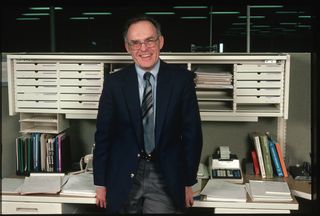Intel co-founder Gordon Moore, author of 'Moore's Law,' dies at 94
Moore famously predicted that the number of transistors in integrated circuits would grow exponentially.

Gordon Moore, who co-founded Intel with Robert Noyce in 1968, died Friday, March 24, 2023 at the age of 94.
The death was reported by Moore's charitable foundation and Intel itself, which say that the scientist and former executive died peacefully while "surrounded by family at his home in Hawaii."
Moore was Intel's CEO from 1979 until 1987. He continued to chair Intel's board until 1997, retiring from the board altogether in 2006.
"Gordon Moore defined the technology industry through his insight and vision," said current Intel CEO Pat Gelsinger. "He was instrumental in revealing the power of transistors, and inspired technologists and entrepreneurs across the decades."
In 2000, Moore and his wife created the Gordon and Betty Moore Foundation to support "scientific discovery, environmental conservation, patient care improvements and preservation of the special character of the San Francisco Bay Area."
Even those who aren't aware of Moore's history at Intel will likely know his name from Moore's Law, which refers to his famous 1965 prediction that the number of transistors in integrated circuits would grow exponentially, doubling every year for 10 years. In 1975, Moore dropped the rate of his prediction to every two years, and although its relevance today is debated, it has held roughly true. Back in 1975, chips held around 5,000 transistors. Last year, Apple unveiled a consumer dual-die chip containing 114 billion transistors.
About what Moore learned from his famous prediction, his foundation's obituary recounts a joke he made in 2015: "Well, once I made a successful prediction, I avoided making another."
The biggest gaming news, reviews and hardware deals
Keep up to date with the most important stories and the best deals, as picked by the PC Gamer team.
Moore is survived by his wife, Betty, sons Kenneth and Steven, and four grandchildren.

Tyler grew up in Silicon Valley during the '80s and '90s, playing games like Zork and Arkanoid on early PCs. He was later captivated by Myst, SimCity, Civilization, Command & Conquer, all the shooters they call "boomer shooters" now, and PS1 classic Bushido Blade (that's right: he had Bleem!). Tyler joined PC Gamer in 2011, and today he's focused on the site's news coverage. His hobbies include amateur boxing and adding to his 1,200-plus hours in Rocket League.
Most Popular






